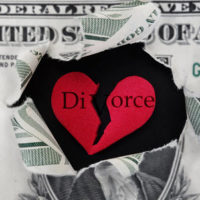Why Accepting Some Marital Debt May Not be a Bad Thing

In a divorce, there is the belief that both getting more assets and being held responsible for as little of the marital debt as possible is the best resolution. Both good things. While this is true for assets, there is more to consider when it comes to dividing debt. In fact, in some cases, being responsible for more of the marital debt can be a good thing.
Dividing Debts
Remember that just as assets will be divided by the divorce court, so too will any debts, liabilities or obligations. But even though a divorce court may give your ex the responsibility for paying a debt, that doesn’t mean that the creditor won’t still hold you responsible.
For things like credit card debt, even though a court says your ex must pay it, if it is not paid, the creditor could still potentially damage your credit , or come after you in court. For secured items such as a car or a house, if these bills are not paid by your ex, you can have the car repossessed, or possibly have the house foreclosed on.
The bottom line is that creditors don’t care what your divorce agreement or divorce court order says. They have their own contracts with you or your ex, which are unaffected by your divorce.
Taking on More Debt
This is why people should consider taking on more of the marital debt in a divorce. Being responsible for the debt avoids the problem of an former spouse ruining your credit (or worse) because they can’t (or won’t) pay a bill they were ordered to pay.
This does not mean that you should take on additional marital debt in return for nothing. In many cases, volunteering to be responsible for more marital debt can be used as a bargaining tool to get other things that are important to you in a divorce agreement.
For example, assume there are two paid off cars in a marriage. Instead of each party getting one car, one spouse may ask to take both cars in return for accepting more marital debt. If a marital asset is to be sold and the proceeds divided, such as a home or a retirement account, the party accepting more debt may want more than what he or she would be entitled to get from that asset in return for accepting the debt.
By strategically dividing the assets and liabilities, a spouse can gets more control over marital debt. Of course, you should never accept more debt than you can pay, and in some cases, this may not be an option. But if it is, accepting debt can be a way to help you gain independence after a divorce, or at least gain some leverage at the bargaining table.
Questions about what to expect in your divorce? Let the Dade City divorce attorneys at the Law Office of Laurie R. Chane help you. Call us today with any questions you may have.
Resource:
leg.state.fl.us/statutes/index.cfm?App_mode=Display_Statute&URL=0000-0099/0061/Sections/0061.075.html

